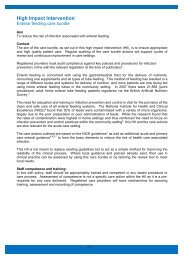Sexualistation of Young People
Sexualistation of Young People
Sexualistation of Young People
Create successful ePaper yourself
Turn your PDF publications into a flip-book with our unique Google optimized e-Paper software.
Sexualisation <strong>of</strong> <strong>Young</strong> <strong>People</strong> Review<br />
64<br />
Conclusion<br />
The research summarised in this<br />
section suggests that there are negative<br />
consequences associated with the<br />
sexualisation <strong>of</strong> children in terms <strong>of</strong> body<br />
dissatisfaction, lower self-esteem, sexual<br />
harassment and views on sexual violence.<br />
It’s unrealistic to assume that we can<br />
stop our children and young people from<br />
seeing sexualised images and messages.<br />
But what we can do is give them tools to<br />
help them understand and interpret what<br />
they see, and build up their confidence<br />
so that they feel secure in their own<br />
identity. In the past it was adult women<br />
who felt the imperative to look ‘sexy’.<br />
Now this imperative is in danger <strong>of</strong> being<br />
adopted by younger and younger girls<br />
who will inevitably face the same feelings<br />
<strong>of</strong> inadequacy, failure to live up to an<br />
unrealistic ideal, and a distillation <strong>of</strong> their<br />
self-worth that it is only based on the<br />
ability to attract attention from others.<br />
Children who don’t feel happy about<br />
themselves are more likely to latch on<br />
to things that promise popularity and<br />
acceptance. As the evidence in this<br />
section shows, all too <strong>of</strong>ten that will<br />
mean conforming either to the hypersexy<br />
or the hyper-masculine norm. The<br />
evidence suggests that children with low<br />
self-esteem, and those without a close,<br />
supportive family network, are most<br />
vulnerable to sexualised content and<br />
most likely to suffer negative impacts.<br />
It’s a double whammy: there’s no one<br />
there to moderate their activities so they<br />
are more likely to have more frequent<br />
and more prolonged exposure to<br />
inappropriate material and when they<br />
are exposed to this material there is no<br />
one there to talk to about it or to help<br />
make sense <strong>of</strong> it.<br />
Many young women now believe that<br />
the only confidence worth having is<br />
sexual confidence – and while sexual<br />
confidence is certainly important it<br />
seems that what this hyper-sexualised<br />
society is selling to girls is actually a<br />
caricature <strong>of</strong> sexual confidence. From<br />
the physical attributes <strong>of</strong> cosmetically<br />
enhanced breasts to the ‘sexual scripts’<br />
<strong>of</strong> pleasing your partner ‘no matter<br />
what’, the porn star ideal <strong>of</strong> sexuality<br />
and beauty is certainly not the only<br />
and arguably not the best way for<br />
young women to attain ownership <strong>of</strong><br />
their sexuality. Perhaps we need to be<br />
discussing with young people that true<br />
sexual confidence and sexual liberation<br />
means that you don’t have to enjoy and<br />
accept all forms <strong>of</strong> sexual entertainment<br />
for the sake <strong>of</strong> seeming comfortable with<br />
your sexuality.<br />
Schools can help children develop<br />
the capacity to interpret and filter<br />
information and to recognise and value<br />
diversity. As such perhaps we need to<br />
consider the value <strong>of</strong> media literacy<br />
and gender studies and begin to see<br />
them as core to the curriculum we<br />
teach our children. Sex education, too,<br />
must focus on preparing young people<br />
to form healthy, respectful, emotionally<br />
fulfilling relationships. Focusing on<br />
prevention <strong>of</strong> STIs and the mechanics<br />
<strong>of</strong> sex, while important, does not<br />
prepare young people for the complex<br />
emotional nuisances, power dynamics,<br />
and performance anxiety <strong>of</strong> early sexual<br />
relationships.<br />
Advertising is a multi-billion pound<br />
industry because it works – it has an<br />
effect – so to say that its impact on young<br />
people hasn’t been proven is disingenuous.<br />
What we need to consider is how the<br />
effect <strong>of</strong> the media interacts with other<br />
factors (psychological, familial and social)<br />
to bring about a situation where young<br />
people’s sexuality is commodified and<br />
ultimately used against them.

















